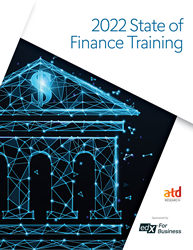March 2, 2022 (Global News Distribution) -
Compliance training and the COVID-19 pandemic fuel increase in learning hours for financial institution employees, according to ATD research.
Employees at financial institutions used an average of 41.2 learning hours annually, 18.1 of which were used for mandatory and compliance training, according to ATD’s 2022 State of Finance Training report.
The 41.2 learning hours are six hours higher than the average learning hours used across all industries. The rise in learning hours can be explained by an increase in required compliance training, and the introduction of new learning content due to the COVID-19 pandemic, according to the 2022 State of Finance Training report, which is sponsored by edX for Business. Examples of mandatory and compliance training include occupational safety and health training (including training related to reducing COVID-19 spread in the workplace), sexual harassment training, and cyberawareness and privacy training.
When it came to customer-facing sales and customer service employees, almost all employers provided training on building relationships with customers and understanding products and services. More organizations provided training in how to detect and report suspected fraud, abuse, and theft compared to 2019, the last time ATD conducted research on training in the finance industry. Additionally, more organizations provided training for emergency preparedness (such as bank robbery).
Other key findings in the report include:
- Finance organizations had an average direct expenditure of $1,139 per employee in the most recently ended fiscal year. Banks, which tend to be larger than credit unions and therefore able to take advantage of economies of scale, had an average direct learning expenditure of $985, which is very close to the $991 seen in the 2019 report. Credit unions had an average direct learning expenditure of $1,386, up about 4 percent from $1,331 in the 2019 report.
- At 78 percent of finance organizations, the talent development teams had recently added new content (or updated content) on how to work remotely (for example, using remote work technology or managing virtually). Furthermore, at eight in 10 finance organizations, the talent development team converted in-person training programs to online formats in response to the COVID-19 pandemic.
While 23 percent of learning hours were delivered in the traditional, live, face-to-face instructor-led classroom, 73 percent were delivered virtually or through e-learning. Technology is especially useful in delivering training where completion needs to be tracked (for example, compliance training).
A free webinar discussing the findings in the report will take place on March 14 at 2 p.m. ET.
About ATD
The Association for Talent Development (ATD) is the world’s largest professional membership organization supporting those who develop the knowledge and skills of employees, improve performance, and help to achieve results for the organizations they serve. Established in 1943, the association was previously known as the American Society for Training & Development (ASTD).
ATD’s members come from more than 120 countries and work in public and private organizations in every industry sector. ATD supports talent development professionals who gather locally in volunteer-led US chapters and international member networks and with international strategic partners.
For more information, visit td.org.
Contact Author
PAULA KETTER
Association for Talent Development
7036838100






